Last Updated on July 28, 2024 by Mary Phagan
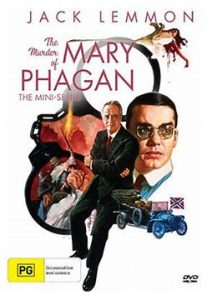 NBC plans Leo Frank miniseries
NBC plans Leo Frank miniseries
On March 22, 1987, the Atlanta Journal and Atlanta Constitution by Monte Plott
"We had a script in 1982, but there was a change in management at the network and they said people don't want historic things. They want [ed] contemporary realism, Stevens said. "Now, there is renewed interest in the historical miniseries and in this case." And in June 1987, Stevens also had the "codicil of Frank's exoneration [pardon without addressing guilt or innocence]" which changed the network in loving the idea and bought a four-hour miniseries.
This verifies that the Tennessean special supplement "AN INNOCENT MAN WAS LYNCHED'" and Alonzo Mann's appearance before the Georgia Board of Pardons and Paroles, THAT THE TENNSESSEAN STAFF INITIATED PLANS FOR A BOOK, AND HAD EVEN SPOKEN TO A PRODUCER FOR A TELEVISION MINISERIES.
I realized that my father's prediction of more books being written about the case and television miniseries was beginning to come true.
Before NBC announced, "The Murder of Mary Phagan as a historical docudrama/miniseries to be released in January 1988, Tom Watson Brown (great grandson of Tom Watson) and I were able to review the teleplay which originally was titled "The Ballad of Mary Phagan" and wrote to inform them of the inaccuracies. Technical assistance was offered to NBC but was turned down.
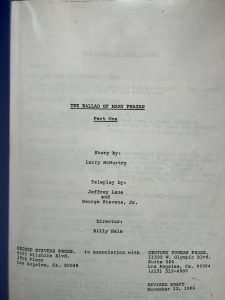
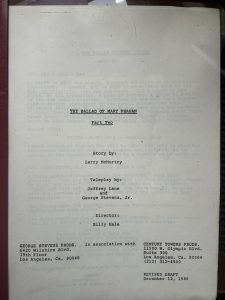
The teleplay was based on Harry Golden's A Little Girl Is Dead, 1965 which had factual errors on every single page and even included the same misspelling of names.
Steve Oney who published his book And the Dead Shall Rise, The Murder of Mary Phagan and the Lynching of Leo Frank, 2003 had the opportunity to read a good deal of the teleplay: "It is inaccurate in many, many points, both specific and in the larger spirit and it takes immense liberties. [Miniseries stirs Phagan controversy, AC, January 7, 1988]
Regrettably George Stevens, Jr. and Jeffrey Lane chose to ignore the truth and did not conduct any historical research regarding the rape- murder of Mary Phagan, the conviction of Leo Frank in 1913 and his lynching in 1915 even though they stated, "some aspects of the case have been changed, scenes have been invented and composite characters created, but they maintain that the miniseries is essentially truthful."[Phil Kloer, Atlanta Constitution, January 7, 1988, Miniseries stirs Phagan Controversy]
The only facts not disputed- Mary Phagan was found murdered in the basement of the National Pencil Factory; Leo Frank, superintendent was arrested, tried and convicted; Slaton Commutation sentences Leo Frank to life in prison and Leo Frank was lynched. And the nightmares continued.
Ironically, The Today Show on NBC contacted my publisher, Joan Dunphy and requested an interview regarding my book Murder of Little Mary Phagan which was recently released the week before on January 25, 1988. Robert Seitz Frey, The Silent and the Damned, 1988 appeared as well. We were interviewed by Deborah Norville from Dalton Georgia.
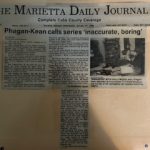
Bill Kinney; January 31, 1988
Marietta Daily Journal After a delayed flight from New York to Atlanta, "Mary Phagan- Kean told the Metro Marietta Kiwanis Club (MDJ Phagan-Kean calls Series 'inaccurate and boring'" "Mary Phagan's great-niece says miniseries isn't history (January 26 & 27, 1988), after viewing Part II that she was 'banking on the intelligence of the American People' and it is a totally fictionalized and Hollywoodized account- the portrayal of the Phagan's as a poor family, John Phagan, Mary's father died before Mary was born, Mary Phagan fighting for her life and Fannie Phagan Coleman spitting in the face of the private detective William J. Burns'." Skip Chesshire, a Kiwanis member: "I was impressed with her poise and the fact she answered each question as honestly as she could. It made me very skeptical of the docudrama on TV after hearing the great-niece of the little girl actually murdered."
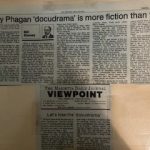
Marietta Daily Journal Associate Editor Bill Kinney has covered Cobb County for over 40 years and is a recognized expert on the Leo Frank case.
"Mary Phagan 'docudrama' is more fiction than fact" [January 26, 1988]
"The 'docudrama' is an idea whose time has never come. It should quickly become a thing of the past."
"Some well-known name's were sullied by miniseries" [January 31,1988]
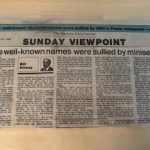
"NBC's nationally televised docudrama on 'The Murder of Little Mary Phagan' was a great work of fiction with an incredible string of misstatements and distortions of fact that characterized the first South-bashing episode."
"NBC missed the Frank case's ABCs [February 2, 1988] "The miniseries falsely puts the Phagan family in a bad light."
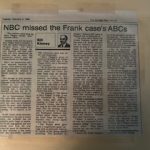
"It's deplorable that a great TV network has so little regard for factual presentation or historical accuracy. It's painful to have to again rehash the historical facts."
Matthew H. Bernstein, Screening a Lynching, University of Georgia Press, 2009 stated that Mary Phagan-Kean's comments to the Metro Marietta Kiwanis Club were "seconded by Celestine Sibley by beloved local columnist who had authored a five-part series on the case for the Constitution twelve years earlier."
Celestine Sibley, [The Atlanta Constitution, January 29, 1988] has been interested in the Phagan-Frank case for years-to the extent of researching and writing a five-part series years ago (1978) and read most of the books, newspapers of the day and transcript of the trial and interviewed many people, some of whom knew firsthand details of the life and time of the principals, if not the deaths.
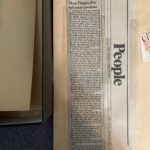
"And now I'm sorry I sat up late two nights to at television's miniseries, 'The Murder of Mary Phagan'. What a terrible thing to do, using the skills of fine actors and technical crews for one of those 'based on productions!'"
"That 'based on true story' label won't wash. Using the real name of people and places and the fictionalizing their character and actions left this viewer reeling with confusion. How much was true? How much in expedient concoction to scriptwriters?'"
"I was glad that they finally worked in Fiddling' John Carson's singing 'Death of Mary Phagan' outside the trial, but when the entire courtroom full of people got to their feet and started singing a hymn like the Mormon Tabernacle Choir in Salt Lake City, I burst into laughter.'"
Georgia experts on the case Bill Kinney and Celestine Sibley book reviews: The Murder of Little Mary Phagan by Mary Phagan, 1987.
Bill Kinney: Marietta Daily Journal, April 24, 1988:
"Ms. Phagan's book is a valuable contribution to the literature on the case, not only because it furnishes heretofore generally unknown information about the victim, the Phagan family and their beliefs about Frank and Conley, but also because Ms. Phagan recites the facts pertaining to the case. It is clear from the narrative that the author, unlike so many other people who have assessed the case. has studied. Indeed, the failing of much that has been written on the Frank case is the authors' reliance on inaccurate or exaggerated summaries of the trial, rather than an independent reviews of the Coroner's Inquest and transcripts of the trial itself. As such, her book, besides containing a touching story of a family's grief, contains historical fact that created the emotions that still rage today. It is be regretted that the publisher (submitted by the author) did not include an index. The annoyance of the absence of footnotes is largely offset by clear references to sources in the text."
Celestine Sibley: Atlanta Journal Constitution, June 12, 1988
"The Murder of Little Mary Phagan", the first book to be written by a member of the slain child's family, and a rather scholarly study of the case...Mary Phagan's is perhaps the most readable and certainly the most thorough recapitulation of the case...Determined to learn all about the case that brought ever-fresh pain to her family, the current Mary Phagan, a Marietta teacher of the blind, spent 10 years collecting evidence in the case and interviewed surviving principals...including Alonzo Mann whose testimony resulted in a posthumous pardon for Frank (without addressing his guilt or innocence)from the Georgia Board of Pardons and Paroles in 1983....Phagan herself strives for objectivity ending her story with questions: 'Will we ever know with complete certainty who killed Mary Phagan? Has the answer gone to the grave with all the participants in the tragedy?'"

- Preface: Final [Last Updated On: October 7th, 2024] [Originally Added On: October 16th, 2023]
- Chapter 15: 1995: The secret deceitful underhanded revisionist political Marker Change at Mary Phagan's Grave by the Parks and Tourism Committee, Marietta City Council and the Jewish Community. Final [Last Updated On: July 28th, 2024] [Originally Added On: October 16th, 2023]
- Chapter 17: 2003: Steve Oney Publishes Book Final [Last Updated On: October 13th, 2024] [Originally Added On: November 5th, 2023]
- Chapter 16: 1998: Parade the Broadway musical is a corruption of history and radical attempt to whitewash a horrible murder and pin it on Jim Conley, a Negro Final [Last Updated On: October 13th, 2024] [Originally Added On: November 5th, 2023]
- INTRODUCTION: FINAL [Last Updated On: April 3rd, 2024] [Originally Added On: December 18th, 2023]
- Chapter 18: Leo Frank Historical Marker Approved in 2006; Dedicated 2008 Final [Last Updated On: July 28th, 2024] [Originally Added On: January 4th, 2024]
- Chapter 19: PBS Documentary: The People vs Leo Frank: 2008; Seeking Justice The Leo Frank Case Revisited: 2009 Final [Last Updated On: July 28th, 2024] [Originally Added On: January 8th, 2024]
- Chapter 20: 100 years: 2013 Final [Last Updated On: July 28th, 2024] [Originally Added On: January 14th, 2024]
- Chapter 26: Phagan Family Position Paper 2021 Final [Last Updated On: July 28th, 2024] [Originally Added On: January 14th, 2024]
- Chapter 25: Jonathan Greenblatt: August 17, 2023, 2022, 2021 Final [Last Updated On: July 28th, 2024] [Originally Added On: January 14th, 2024]
- Chapter 21: 2015: 100 years after Leo Frank Lynching Final [Last Updated On: July 28th, 2024] [Originally Added On: January 15th, 2024]
- Chapter 22: 2019: Fulton County Conviction Integrity Unit [CIU] Established to Exonerate Leo Frank Final [Last Updated On: December 9th, 2024] [Originally Added On: January 21st, 2024]
- Chapter 28: January: 2024-2025 Fani Willis, Fulton County DA Investigated by Georgia Senate Commission Final [Last Updated On: April 12th, 2025] [Originally Added On: January 23rd, 2024]
- Chapter 27: Cobb Librarian Discusses the Lynching of Leo Frank: 2023 Final [Last Updated On: July 28th, 2024] [Originally Added On: January 23rd, 2024]
- Contents: Final [Last Updated On: August 13th, 2024] [Originally Added On: March 25th, 2024]
- Glossary: Final [Last Updated On: October 10th, 2024] [Originally Added On: March 25th, 2024]
- Appendix [Last Updated On: June 18th, 2024] [Originally Added On: March 25th, 2024]
- Dramatis Personae/Who's Who: Final [Last Updated On: October 10th, 2024] [Originally Added On: March 25th, 2024]
- Epilogue: Final [Last Updated On: December 17th, 2024] [Originally Added On: March 25th, 2024]
- Chapter 24: Roy Barnes Mercer Law School (November 12, 2019) Final [Last Updated On: July 28th, 2024] [Originally Added On: June 1st, 2024]
- Chapter 23: Fulton County Paul Howard defeated by Fani Willis; November 6, 2019 Final [Last Updated On: July 28th, 2024] [Originally Added On: June 1st, 2024]
- Chapter 29: Seeking Justice for Little Mary Phagan: Add Newsletters 2-14 Here Phagan Family Newsletter Collection [Last Updated On: April 12th, 2025] [Originally Added On: July 23rd, 2024]